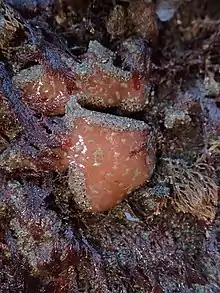Aplidium solidum
Aplidium solidum is a species of colonial sea squirts, a tunicate in the family Polyclinidae. It is commonly known as the red ascidian or sea pork.
| Aplidium solidum | |
|---|---|
 | |
| Scientific classification | |
| Kingdom: | Animalia |
| Phylum: | Chordata |
| Subphylum: | Tunicata |
| Class: | Ascidiacea |
| Order: | Enterogona |
| Family: | Polyclinidae |
| Genus: | Aplidium |
| Species: | A. solidum |
| Binomial name | |
| Aplidium solidum (Ritter & Forsyth, 1917)[1] | |
| Synonyms[1] | |
| |
Description
Aplidium solidum is a compound tunicate forming sheets or slabs up to 20 cm across on rocks and other hard substrates. The tunic is gelatinous but firm in consistency, 2 to 3 cm thick and a red or pink colour. The individual zooids are bright red, 12 mm long and arranged in small systems. There are usually 13 to 15 rows of gill-like perforations in the pharynx of each.[2][3]
Distribution
The type location of Aplidium solidum is Pemba Island, Tanzania and it is also found in Australian waters.[1] It occurs on the west coast of North America from British Columbia south to California where it is common on rocks, especially among the holdfasts of kelp forests, and pilings.[2] It occurs in the intertidal zone and at depths down to 40 metres.[3]
Biology
Aplidium solidum is a filter feeder. Water is sucked into the interior of the organism through an oral aperture and then expelled through a larger one, common to all the zooids in the system. Phytoplankton and other small organisms get trapped in mucus threads secreted by the endostyle.[3]
This tunicate breeds in the spring and summer and broods its larvae in its atrial cavity.[3]
The nudibranch, Hermissenda crassicornis, feeds on this tunicate.[2]
References
- Aplidium solidum (Ritter & Forsyth, 1917) World Register of Marine Species. Retrieved 2011-11-21.
- Aplidium solidum SeaNet. Retrieved 2011-11-21.
- Aplidium solidum Archived 2012-04-04 at the Wayback Machine WallaWalla. Retrieved 2011-11-21.